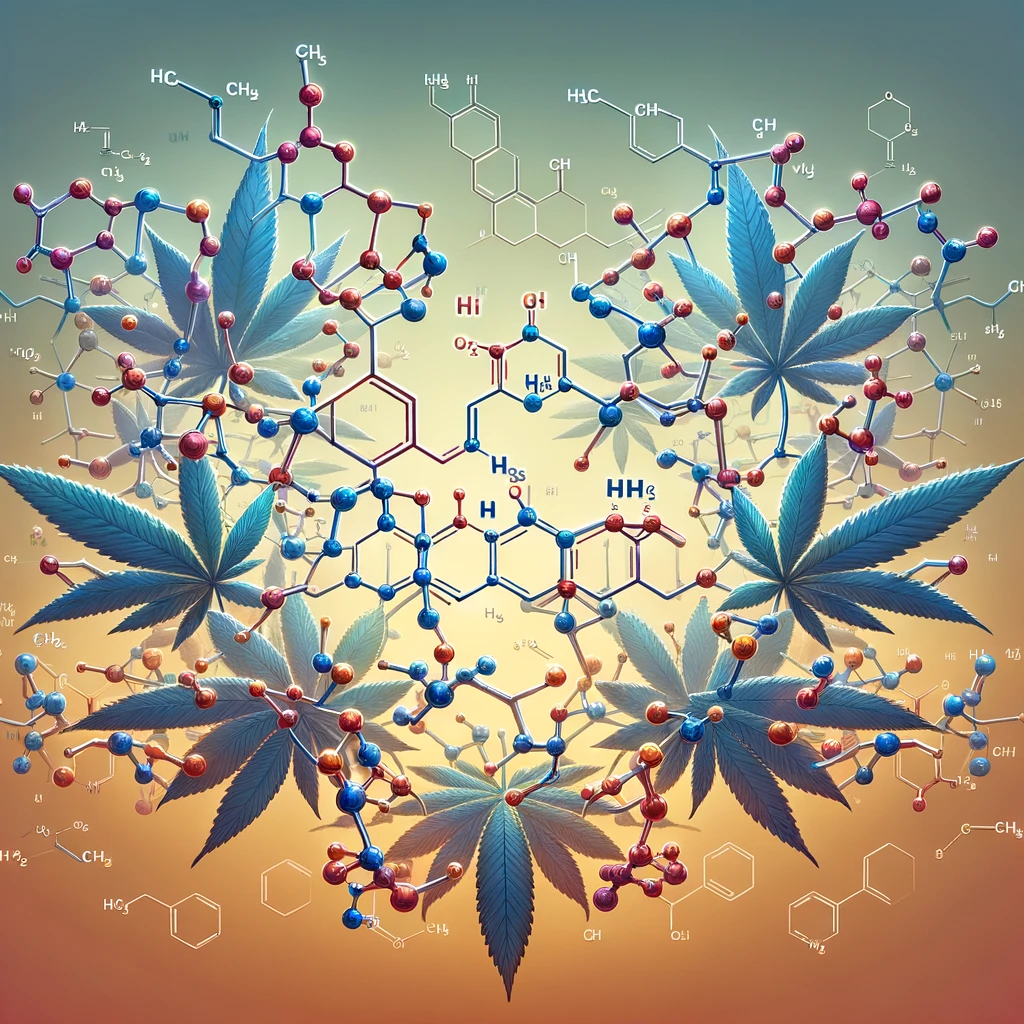Navigating the Cannabis Compound Spectrum
In recent years, the evolving landscape of cannabis legalization and the burgeoning interest in its derivatives have led to a heightened curiosity about cannabinoids like Hexahydrocannabinol (HHC) and Tetrahydrocannabinol (THC). Both these compounds have garnered significant attention for their unique properties and effects.
Step into the captivating world of Hexahydrocannabinol (HHC) and Tetrahydrocannabinol (THC), where each compound stands out for its unique contributions to wellness and recreational enjoyment. These two cannabinoids have piqued the interest of many, offering everything from nuanced shifts in how we perceive the world to significant health-related advantages.
By examining the unique and overlapping characteristics of HHC and THC, we strive to illuminate the essential elements that underscore the importance of recognizing these distinctions.

The Chemistry Behind HHC and THC: What You Need to Know
At first glance, THC and HHC seem like distant cousins in the vast cannabinoid family, but a closer examination reveals they’re more like siblings with subtle differences. THC, the well-known star of the cannabis plant, carries a unique double bond in its molecular structure, a feature that’s directly linked to its potent psychoactive effects. HHC, however, steps onto the scene with a slight twist – it’s hydrogenated, meaning those double bonds are saturated, giving HHC a similar, yet distinct, profile.
This tiny molecular tweak doesn’t just alter the potency; it significantly impacts how stable HHC is compared to THC, especially when it comes to exposure to air and light. It’s these nuances that can influence your experience, offering a range of effects from euphoric highs to more subtle, relaxed states.
Understanding the Distinctive Characteristics of HHC and THC
Tetrahydrocannabinol, commonly known as THC, is the most well-known cannabinoid found in the Cannabis sativa plant. Renowned for its psychoactive properties, THC is responsible for the “high” sensation associated with cannabis use. Its molecular structure, particularly the presence of a double bond on the ninth carbon atom, plays a crucial role in how it interacts with the human body’s endocannabinoid system (ECS).
THC predominantly binds with CB1 receptors in the central nervous system, contributing to its psychoactive effects.

Effects and Benefits of THC
THC has been studied extensively for its various effects and potential benefits. These include:

- Euphoria And Relaxation: THC can induce feelings of euphoria and relaxation, contributing to its recreational use and potential for stress relief.
- Alleviation Of Discomfort And Pain: THC may have analgesic properties, offering relief from discomfort and pain, making it a potential option for medical use in managing certain conditions.
- Appetite Stimulation: THC is known to stimulate appetite, commonly referred to as the "munchies," which can be beneficial for individuals with conditions causing appetite loss or weight loss.
- Nausea And Vomiting Relief: THC has antiemetic effects, making it useful in alleviating nausea and vomiting, particularly for patients undergoing chemotherapy or experiencing other medical issues causing these symptoms.
It’s important to note that THC’s effects can vary based on dosage, individual tolerance, and the type of cannabis product used.
HHC: The Emerging Cannabinoid
Hexahydrocannabinol, or HHC, is a relatively lesser-known cannabinoid that has gained interest in recent years. Discovered in the 1940, HHC was created through the hydrogenation of THC. This process alters THC’s molecular structure, replacing the double bond with hydrogen atoms. While HHC shares some similarities with THC, its modified structure leads to different effects and potential uses.

Potential Benefits and Effects of HHC
Though research on HHC is still in its nascent stages, preliminary findings and anecdotal evidence suggest that HHC may offer benefits similar to THC, but with a milder profile. These include:

- Mild Euphoria And Relaxation: THC can induce a gentle sense of euphoria and relaxation, contributing to a mild altered state of consciousness.
- Potential Discomfort Relief: THC shows promise in providing relief from various forms of discomfort, including pain and inflammation, making it a target for therapeutic applications.
- Reduced Intensity Of Psychoactive Effects: Some individuals may experience a reduction in the intense psychoactive effects of THC, which can be desirable for those seeking a milder or more controlled cannabis experience.
It’s important to approach HHC with caution due to the limited research and variability in product quality and composition.
Comparing HHC and THC: A Closer Look

Making the Choice: HHC or THC?
The decision between Hexahydrocannabinol (HHC) and Tetrahydrocannabinol (THC) often boils down to personal needs, preferences, and the specific effects one seeks from their cannabis experience. HHC, with its unique properties and effects, might be particularly appealing to certain individuals. Here’s a closer look at who might prefer HHC over THC.
- The Psychoactive Journey
- Therapeutic Horizons
- THC VS HHC: Distinctions
The road traveled by THC is well mapped out, with destinations ranging from euphoria and creativity to relaxation and, for some, anxiety or paranoia. It’s a powerful compound that interacts with the brain’s CB1 receptors, leading to its famous psychoactive effects.
Enter HHC, the newer, less explored path. Its journey is marked by a milder psychoactive experience. Think of HHC as the calm, collected sibling to THC’s bold, outgoing personality. It’s about 70-80% as potent as THC, offering a gentler nudge rather than a forceful push into altered states of consciousness. For those seeking relief without the intense high, HHC presents an appealing alternative.
Both HHC and THC have their merits in the realm of potential health benefits. THC’s ability to alleviate pain, manage insomnia, and reduce anxiety is complemented by the “high” it produces, which some find therapeutic in itself. HHC, while still under investigation, shows promise for offering similar benefits without the strong psychoactive effects. It’s an exciting area of research that continues to evolve, offering hope and relief for many.
While HHC and THC share a common origin and some effects, their differences are significant:
- Chemical Structure: THC’s notable double bond versus HHC’s hydrogenated structure.
- Psychoactive Effects: THC typically produces more pronounced psychoactive effects, while HHC’s effects are generally milder.
- Legal Status: THC’s legality varies significantly by state, whereas HHC often benefits from the legal status of hemp-derived products but faces uncertain regulatory status.
Who Should Choose THC?

THC may be more suitable for individuals seeking:
For those who appreciate the profound psychoactive experience that cannabis can offer, THC is the go-to cannabinoid. It's renowned for delivering a strong euphoric high, enhancing sensory perception, and fostering creativity or deep contemplation. Users looking for a significant alteration in consciousness or an escape from the mundane will find THC to be their ally.
THC has been extensively researched for its medicinal properties, offering relief for a variety of conditions. Patients dealing with chronic pain, severe nausea, appetite loss, or insomnia may find THC-based treatments more effective than HHC. Its ability to interact powerfully with the body’s endocannabinoid system makes it a potent therapeutic agent for those with medical conditions that respond well to cannabis.
Individuals living in regions where cannabis is legal for medical or recreational use might prefer THC due to its availability and the variety of product forms it comes in. Legal markets offer regulated, quality-controlled products ranging from edibles and tinctures to vapes and flowers, allowing for a safer and more informed consumption experience.
Veteran cannabis enthusiasts who are accustomed to managing the effects of THC may prefer it over HHC for its potency and the broad spectrum of experiences it offers. Experienced users often develop a tolerance to THC's psychoactive effects, enabling them to enjoy the benefits without unwanted side effects. These individuals might find THC's impact more satisfying and aligned with their consumption goals.
Who Should Opt for HHC?

HHC could be a better choice for those who prefer:
For those who are interested in the therapeutic and relaxation benefits of cannabis but are wary of the intense psychoactive effects associated with THC, HHC offers a compelling alternative. Since HHC is reported to have a milder impact on cognition and perception, it's an excellent choice for users who want to maintain a clearer head while still enjoying the benefits of cannabinoids.
Some individuals may find that THC triggers anxiety, paranoia, or other uncomfortable side effects. For these users, HHC can be a preferable option. Its altered chemical structure is believed to interact with the body's endocannabinoid system in a way that reduces the likelihood of such adverse reactions, making it a safer bet for those with THC sensitivities.
The legal status of cannabis products varies greatly from one region to another, and THC is still strictly regulated or illegal in many places. HHC, being a relatively newer and less regulated cannabinoid, might provide a legal alternative for individuals residing in areas where THC products are not permitted. However, it's important to check local laws as regulations are constantly evolving.
Enthusiasts who enjoy experimenting with different cannabinoids to understand their effects and benefits might find HHC particularly intriguing. As a less common component of the cannabis spectrum, HHC offers a novel experience. Its unique effects compared to THC and other cannabinoids make it a valuable addition to the repertoire of those keen on exploring the full potential of cannabis.
HHC and THC: Personal Preferences and Health Goals
Deciding whether HHC or THC is right for you also depends on personal preferences and health goals. Those seeking the profound psychoactive effects of THC for recreational use or as part of their therapeutic regimen might prefer THC-rich products. Conversely, individuals interested in exploring the benefits of cannabinoids without the intense high might find HHC more appealing, especially if they are looking for a compound that can be used more discreetly or during regular daytime activities.
FAQ
The primary distinction between Hexahydrocannabinol (HHC) and Tetrahydrocannabinol (THC) lies in their chemical structures and resultant psychoactive effects. THC is known for its potent psychoactive properties, which can induce strong euphoria and sensory alteration. HHC, meanwhile, is a hydrogenated form of THC, offering similar but milder psychoactive effects and potentially fewer legal restrictions.
No, HHC is generally considered to be less potent than THC. While individual experiences can vary, HHC is estimated to deliver around 70-80% of the psychoactive potency of THC, making it a preferable option for those seeking milder effects.
It's currently unclear how HHC metabolizes in the body, and limited research exists on whether it can trigger positive results on standard drug tests for THC. Given the variability in metabolism and the lack of definitive studies, it's possible that HHC could be detected, especially in tests sensitive to a wide array of cannabinoids.
In some regions, HHC might offer legal advantages over THC due to its status as a less regulated cannabinoid. However, the legal landscape for cannabinoids is rapidly changing, and HHC's legal status could evolve. Always check your local laws and regulations to ensure compliance when choosing between HHC and THC.
Yes, THC has been used for various medical purposes and is an active ingredient in several prescription medications. It has been shown to provide relief for chronic pain, nausea, and muscle spasms, among other conditions. Medical use of THC is subject to local laws, with many regions requiring a prescription or medical cannabis card.
Beginners should start with low doses and go slow, regardless of whether they're using HHC or THC. This approach allows individuals to gauge their tolerance and sensitivity to the effects of each cannabinoid. It's also advisable to consume cannabinoids in a safe, comfortable environment and, if possible, with someone experienced.
Yes, both THC and HHC can lead to side effects, though the intensity and nature of these effects can vary based on the individual, dosage, and frequency of use. Common side effects of THC include dry mouth, red eyes, increased appetite, and in some cases, anxiety or paranoia. HHC is believed to have milder side effects due to its reduced potency, but comprehensive studies on its side effects are still lacking.

A Journey of Self Discovery
Choosing between HHC and THC is an adventure in self-discovery, offering a spectrum of experiences and benefits. As we learn more about these compounds, their potential to enhance wellness and quality of life becomes increasingly clear.
Whether you lean towards the milder, steadier experience of HHC or embrace the potent, “high” of THC, there’s a cannabinoid out there that resonates with your unique appetite for the desired result.




